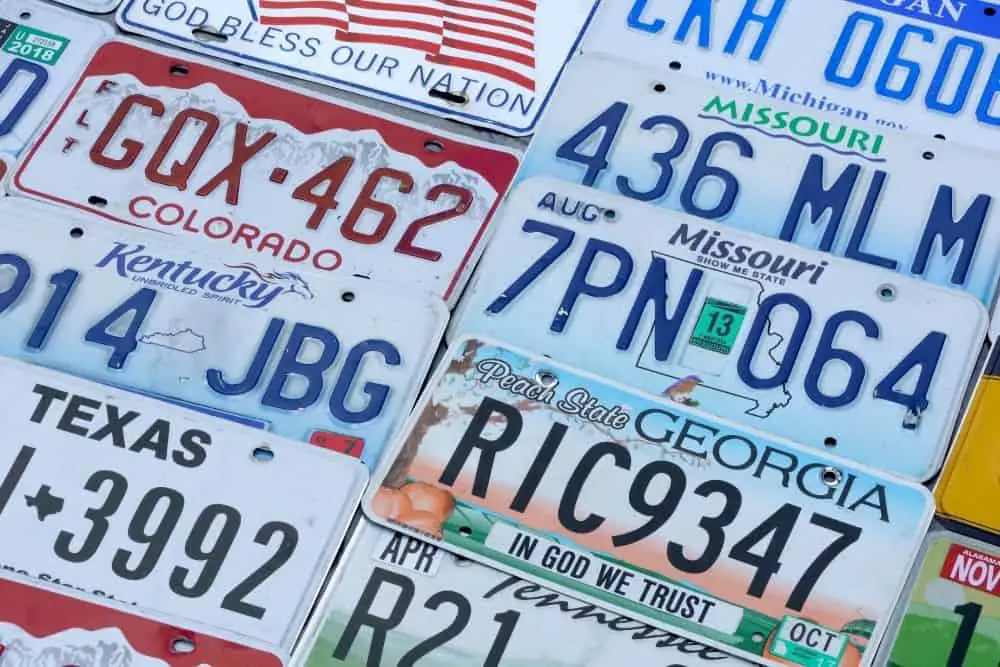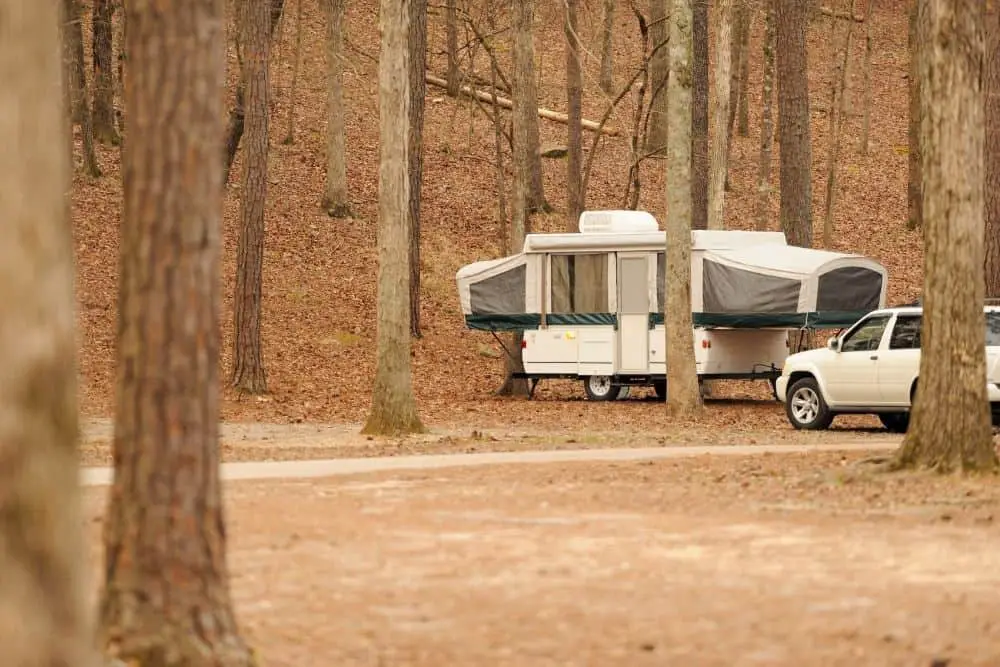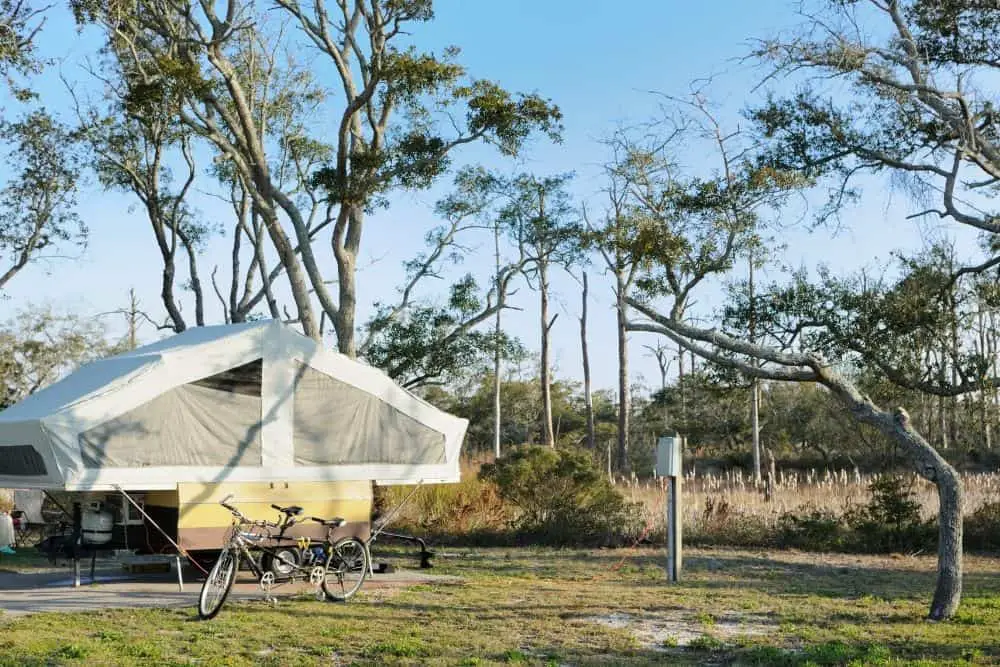When it comes to pop-up campers, many people worry about whether or not they require a license plate. There’s no need to look any further. There is no need to worry; we’ve got you covered.
Pop-up campers are great for traveling with the conveniences of home. They can be used in a variety of ways and are quite light.
In addition, traveling with a camper allows you to see a lot of new places while still spending time with your family and friends.
In order to have a stress-free trip, you should keep these tips in mind if you’re new to trailer towing.
So, does a pop-up camper need a license plate? Yes, In order to tow a pop-up camper trailer, you’ll need a plate. Also, make certain that your license plate is always clean enough to be readable to avoid getting pulled over.
What is a Pop-Up Camper?
To make them easier to tow, pop-up campers collapse and fold up. Roofs and/or sides can be collapsed to save space. As a result, they’re lighter to haul and use less fuel.
Pop-up campsites can have hard sides and roofs. Others have softer, more tent-like edges.. These campers are more lightweight, but they are not as well-protected from the elements as the hard-sided models are.
Tents can be uncomfortable places to sleep, but pop-up campers are an excellent alternative. Some even have facilities like kitchens or restrooms.
Rather than renting a huge motorhome or RV, you can bring many of the comforts of home with you in a pop-up camper.
Pop-up campers are easier to back up than other types of camper trailers since they are not as tall. In the rearview mirror, you’ll still have plenty of visibility.
Wind resistance is reduced in pop-up campers that have been folded down.
Adding a trailer will reduce your gas mileage, but pop-up campers offer better gas mileage than many other types of camper trailers.
Pop-up campers are a popular choice for campers on a budget. Pop-up trailer tents aren’t luxurious, but if you’re tired of sleeping in a tent and want something more, this is it.
Do Pop-Up Camper Trailers Need License Plates?
License plates are required for most trailers that you tow. Pop-up camper trailers, boat trailers, and other types of travel trailers are included in this category.
Make that your trailer has the correct lighting requirements in order to ensure the safety and legality of your pop-up camper.
Brake lights, turn signals, and a white light to draw attention to your trailer’s license plate are all part of the lighting requirements for your trailer.
If you’re going to be camping in a muddy region, make sure you clean off the license plate of your pop-up camper before you drive anywhere.
What if You Do Not Have a License Plate for Your Trailer?
A trailer license plate requires numerous processes to obtain, but once you have one, your trailer will be legal to drive and you can continue your explorations.
To begin, you must show that you are the legal owner of the trailer. It’s possible to use a bill of sale to accomplish this. If you don’t currently have a title for your trailer, this can assist you in obtaining one.
If you’ve misplaced your trailer’s title, don’t despair. Most states provide programs that can assist you in obtaining a new title.
If your trailer was purchased in a different state than the one in which you currently reside, you may be required to obtain VIN verification.
Every state has its own requirements for registering trailers, so you may not need to take this step if yours doesn’t.
The following step is to register your trailer with the state. Most state DMVs offer an online form for this purpose. If you can’t find the form, or if the online form isn’t working properly, you can obtain a paper copy from the DMV.
Before your registration may be accepted, you may have to go through a safety check after you’ve submitted your application.
Before you begin the review, verify that your trailer’s lights and brakes are operating properly.
You can pay the registration fees and obtain a license for your trailer once it has passed the safety inspection.
Never Lose A Trailer License Plate Again With This Tip >> Check out the video below:
Maintaining the License on Your Pop up Trailer Tent
Keep your trailer’s license current to avoid problems in the future. There are a variety of approaches to this.
Keep an eye on the expiration date of your registration. To keep your trailer lawful, you’ll have to re-register it with the DMV on a regular basis.
This helps to keep track of who owns which trailer, so if there’s a dispute, yours can be identified.
Tip – Verify that your license plate is securely fastened to your trailer. Pop-up campsites may be found just about anywhere these days. This could mean that they may get beaten up.
After hitting a pothole, be certain your license plate doesn’t come off. Keep it safe and secure by securing it firmly. Throughout your journey, make sure to check to see if it’s still there.
Clean up after yourself, especially when it comes to your license plate. Make sure your license plate is always visible. Licence plates that have been caked in dirt are most likely to become unreadable. Fortunately, the solution to this dilemma is quite simple.
Remove any mud or grime from the plate with a wet rag and you’ll be good to go.
Make sure the light that illuminates your license plate is in working order before you leave the house. If you fail to display your license plate properly, you risk being stopped. Your camping trip will be disrupted because of this difficulty.
Before embarking on a journey, make sure the lights are in working order. Check to see whether any of the lightbulbs are damaged or burned out before using. If this is the case, look for a replacement on the internet or in a local auto supply shop.
Driving Safely with a Pop-Up Camper
When compared to other types of trailers, pop-up tents require less effort to tow. You’ll most likely want to hit the road as soon as your trailer is licensed.
To keep your trailer (and your family) safe, be mindful of your surroundings and adhere to following guidelines.
- Check to see how much weight your towing vehicle can safely pull before you start the towing process. Carrying too much weight can cause harm to your car’s structure, engine, and transmission. To find out how much weight your car can pull safely, consult your owner’s manual. Keep in mind that the additional weight of your gear and water will raise the overall weight of your trailer.
- Driving with a trailer requires practice. With a trailer, backing out of spots is more difficult than it is with a car. Try practicing turning and backing up in a wide open area.
- Before you start driving, make sure your trailer is equipped with all necessary safety features. Check that all of your trailer’s lights are working, including the brakes, turn signals, and any other lights. Make sure your towing vehicle has an electrical connection so your lights will work while you’re driving. Attach the chains and double-check that your towing vehicle’s hitch is securely fastened to the trailer.
- When towing a pop-up camper, allow for more stopping distance. Despite the fact that pop-up campers are among the lighter camper trailer options, they still add weight, making stopping a little more challenging. Be sure to give yourself enough time to react to the car in front of you. When approaching stop lights and stop signs, be aware of the additional weight.
- When towing a trailer, be prepared to make adjustments. The trailer and your vehicle can be damaged if you make a sudden turn. Don’t rush it, and if it doesn’t work, don’t be afraid to try something else.
- Remember to check your mirrors and blind spots before merging, since your car is now many feet longer than it was when you started. When towing a trailer with a pop-up camper, it’s easier to see out of the back window, but it can still block your view from certain angles, so look both ways before pulling the trailer to keep yourself and others on the road safe.
- The middle or right lane is the safest place to drive on the highway. When towing a pop-up camper, your reaction time will be slowed, so stay in the right lane so other drivers can safely pass you.
- Keep an eye out for parking lots with more space. Extra parking space is required if you’re stopping to gather supplies or food. Finding parking spaces with a pull-through lane may be less of a hassle than trying to back into one.
- Before attempting to go backwards, make sure you have everything you need to do it safely. To prevent accidents, make sure no one is walking behind the trailer and that nothing can be seen from the towing vehicle, such as bicycles, tents, or coolers.
By following these safety precautions, you’ll be able to have a great time while using your pop-up trailer tent. Being safe on the road allows you to save money and time, which you can then use for the things that are most important to you.
In Conclusion
Pop-up campers allow you to take the comforts of home on the road in a convenient and cost-effective manner.
License plates are required for pop-up campers. If yours doesn’t have one, you can register your trailer and get a license from your local DMV.
Have a great time and be safe when traveling in your pop-up camper!



